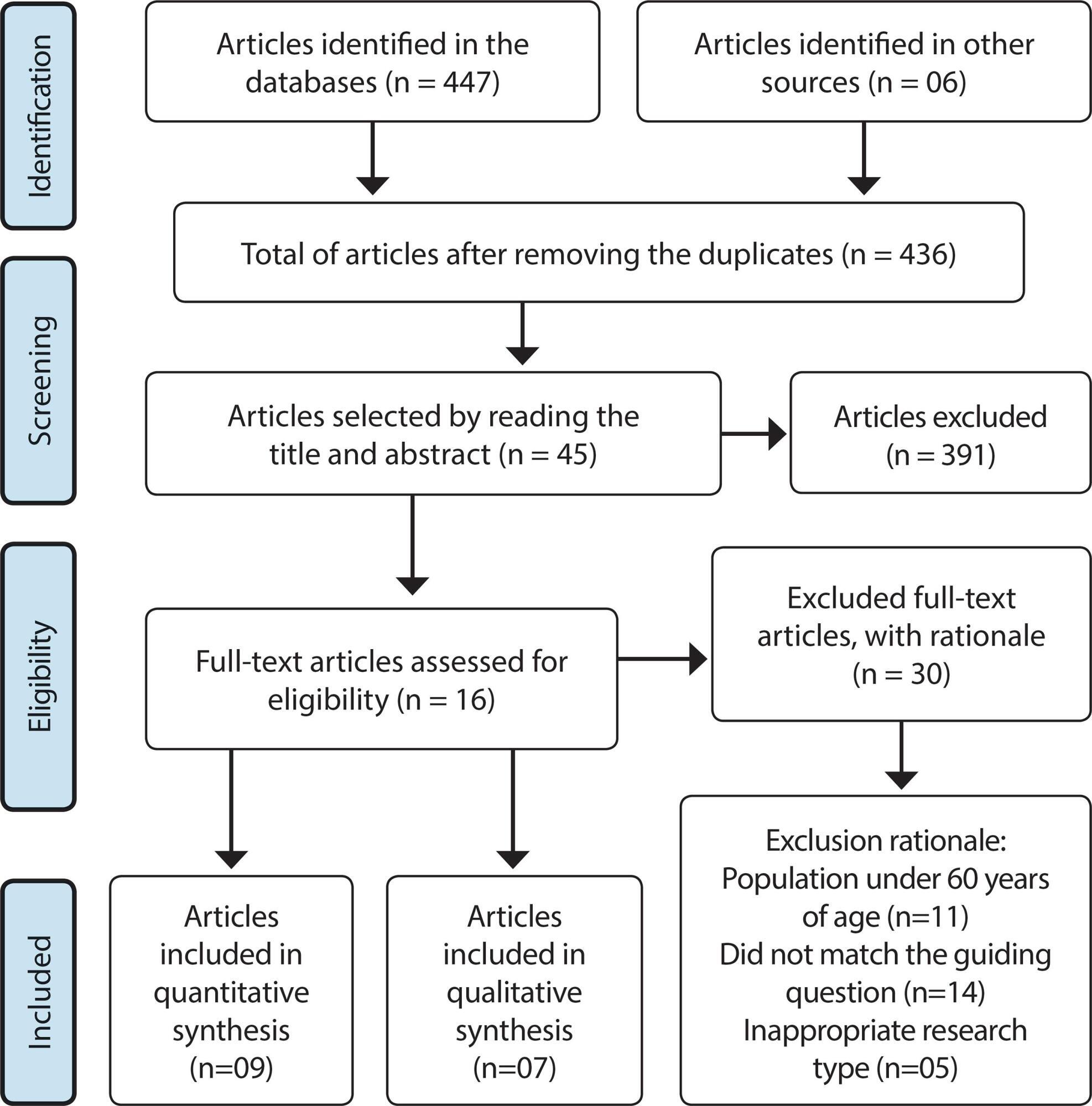-
REVISÃO
Assumptions of good practices in home care for the elderly: a systematic review
Revista Brasileira de Enfermagem. 2019;72(suppl 2):302-310
12-05-2019
Resumo
REVISÃOAssumptions of good practices in home care for the elderly: a systematic review
Revista Brasileira de Enfermagem. 2019;72(suppl 2):302-310
12-05-2019DOI 10.1590/0034-7167-2018-0445
Visualizações0ABSTRACT
Objective:
To synthesize the knowledge produced on best nursing practices in long-term care for elderly at home, in order to promote healthy aging.
Method:
A systematic review, based on the Joanna Briggs Institute’s proposal: without restriction of dates; in the English, Portuguese and Spanish languages; conducted in PubMed, CINAHL, LILACS, Embase and Scopus databases.
Results:
Among 453 articles identified, 16 were included in the review: seven qualitative and nine quantitative, published between 1996 and 2015. The synthesis of the data identified as best practices identifies a premise of care centered on the elderly and the inclusion of the elderly, family and nurses as agents of this care.
Conclusion:
According to evidence, good practices in gerontological and nursing home care fundamentally depend on constant planning and reorganization, so that they are indeed comprehensive and contextualized. Thus, providing care will be reasoned by and driven to the elderly, based on their specific and global needs, favoring a process of healthy and active aging.
Palavras-chave: Geriatric NursingHealth Services for the AgedHome Care ServicesHome Health NursingReviewVer mais
-
REVISÃO
Health promotion of frail elderly individuals and at risk of frailty
Revista Brasileira de Enfermagem. 2019;72(suppl 2):319-327
12-05-2019
Resumo
REVISÃOHealth promotion of frail elderly individuals and at risk of frailty
Revista Brasileira de Enfermagem. 2019;72(suppl 2):319-327
12-05-2019DOI 10.1590/0034-7167-2018-0575
Visualizações0Ver maisABSTRACT
Objective:
To identify interventions for the health promotion of frail elderly individuals and those at risk of frailty.
Method:
Integrative review of the literature performed in the following databases: LILACS, CINAHL, MEDLINE, Web of Science, COCHRANE and Scopus, using the
Descriptors:
“frail elderly”, “aging”, “health services for the aged” and “health promotion” combined with Boolean operators “AND” and “OR”.
Results:
Randomized controlled clinical trials (RCTs) classified as level of evidence II represented 82.6% of studies. Interventions were analyzed according to the following categories: Interventions for the elderly at risk of frailty and Interventions for the frail elderly.
Conclusion:
The following interventions were identified: educational multiprofessional group meetings, physical training, home visit/home care program, nutrition assessment and supplementation, health maintenance programs and cognitive training; models/programs of management and monitoring, use of assistive technology devices and hospitalization program for geriatric rehabilitation.

-
RESEARCH
Effectiveness of an educational intervention on knowledge-attitude-practice of older adults’ caregivers
Revista Brasileira de Enfermagem. 2018;71(3):1055-1062
01-01-2018
Resumo
RESEARCHEffectiveness of an educational intervention on knowledge-attitude-practice of older adults’ caregivers
Revista Brasileira de Enfermagem. 2018;71(3):1055-1062
01-01-2018DOI 10.1590/0034-7167-2017-0100
Visualizações0ABSTRACT
Objective:
To compare the knowledge, attitude and practice of older adults’ caregivers before and after an educational intervention in the domains of the care between caregiver and older adult, feeding, bathing, hygiene and mobility and transportation.
Method:
Quasi-experimental study carried out with 82 caregivers, of which 34 participated in the intervention. Interviews were conducted through a knowledge, attitude and practice research on the older adults` care
Results:
The educational intervention led to improvements in knowledge, attitude and practice, with statistical significance of attitude (p <0.020) and practice (p <0.001), in the domain of the care between caregiver and older adult; knowledge (p <0.001) and practice (p <0.003) in feeding; Knowledge (p <0.001) and practice (p <0.001) in bathing and hygiene; and knowledge (p <0.001), attitude (p <0.001) and practice (p <0.001) in mobility and transportation. The analysis of the 34 caregivers who started and completed the study showed an improvement in attitude in most of the domains.
Conclusion:
the educational intervention is an effective and viable strategy for older adults’ caregivers.
Palavras-chave: CaregiversHealth EducationHealth Knowledge, Attitudes, PracticeHealth Services for the AgedHome NursingVer mais -
RESEARCH
Emergency care units and dimensions of accessibility to health care for the elderly
Revista Brasileira de Enfermagem. 2018;71(suppl 2):811-817
01-01-2018
Resumo
RESEARCHEmergency care units and dimensions of accessibility to health care for the elderly
Revista Brasileira de Enfermagem. 2018;71(suppl 2):811-817
01-01-2018DOI 10.1590/0034-7167-2017-0440
Visualizações0ABSTRACT
Objective:
to understand the conception of the elderly and their caregivers about the accessibility to health mediated by the service in Emergency Care Units.
Methodo:
a qualitative study conducted with 25 elderly patients and caregivers at Emergency Care Units in a city of Paraná, using Grounded Theory as a methodological reference.
Results:
According to the participants, the resources available in these services guarantee medical consultation and provide access to exams and medicines. Such resources have attracted patients and caused excess demand, which implies a set of compromising factors for the quality of care in these services.
Final considerations:
Investments in the restructuring of the care network, especially in primary care, with an increase in the number of consultations and the creation of a bond, can contribute to the emergency care units achieving the goal of access to qualified assistance to the elderly population.
Palavras-chave: Comprehensive Health CareEmergency Medical ServicesHealth Services AccessibilityHealth Services for the AgedQuality of Health CareVer mais -
PESQUISA
From real to ideal – the health (un)care of long-lived elders
Revista Brasileira de Enfermagem. 2015;68(3):398-405
06-01-2015
Resumo
PESQUISAFrom real to ideal – the health (un)care of long-lived elders
Revista Brasileira de Enfermagem. 2015;68(3):398-405
06-01-2015DOI 10.1590/0034-7167.2015680304i
Visualizações0Ver maisABSTRACT
Objective:
to analyze similarities and dissimilarities in the meanings assigned to health care by long-lived elders and nursing professionals in a healthcare setting.
Method:
ethnographic qualitative research, based on the Spradley-McCurdy method and the interpretive anthropology of Geertz and Kleinman. The sample consisted of 20 key informants. Data were collected through participatory observation and ethnographic interviews from March to October 2013 and analyzed in domains, taxonomies and cultural themes.
Results:
Six domains and cultural taxonomies emerged and revealed reasons, attributes, and resources in providing care in relationship to long-lived elders and nursing professionals; fi nally, the following cultural theme emerged: the real to the ideal - the health (un)care of long-lived elders.
Conclusion:
The study showed the distance between the desired and actual health care provided to aged people in the scenario studied.



